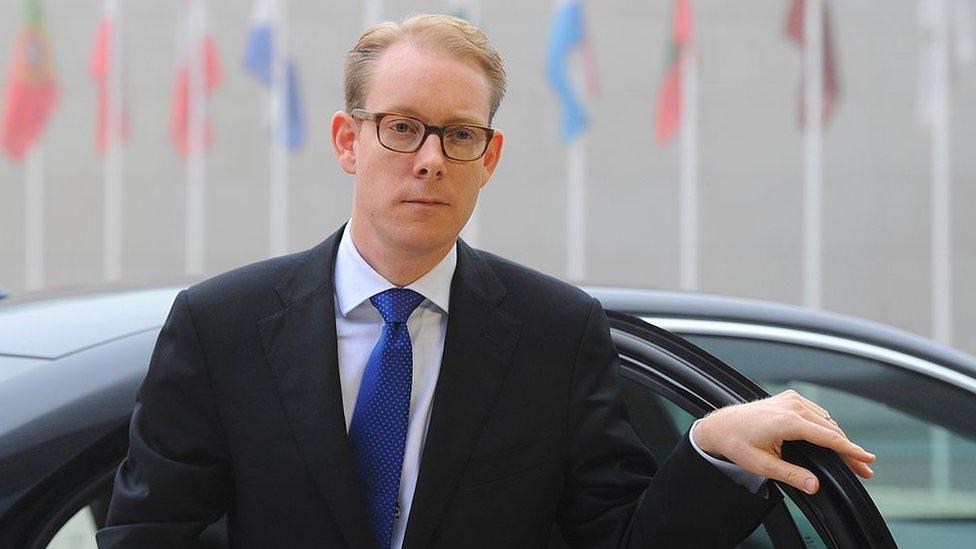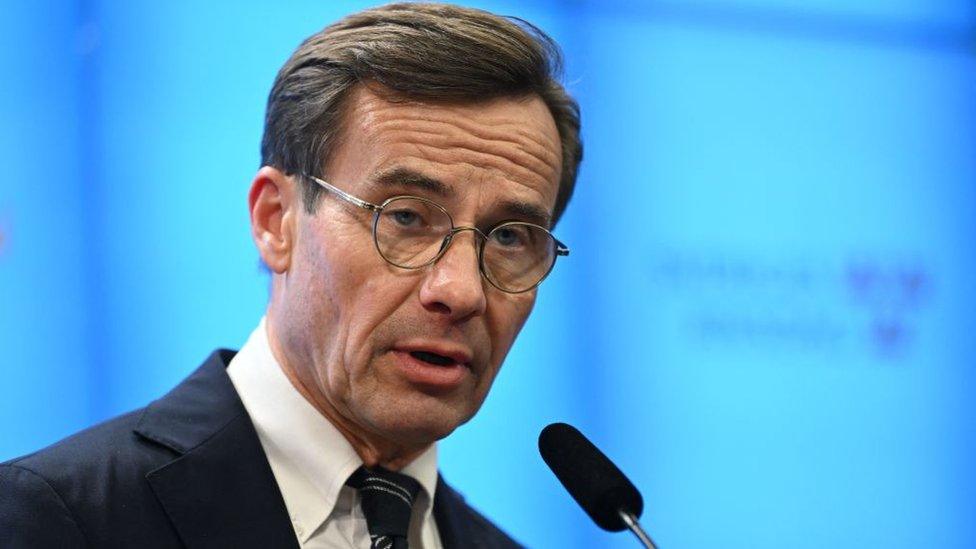Sweden ditches 'feminist foreign policy'
- Published

The new Swedish foreign minister scrapped the "feminist foreign policy" soon after the new government's appointments were announced.
Sweden's new foreign minister has ditched its pioneering "feminist foreign policy", saying the label has become more important than its content.
But Tobias Billstrom said "we will always stand for gender equality".
The previous left-wing government launched the policy in 2014, becoming the first in the world to put gender equality at the heart of its dealings with other nations.
The self-labelled "feminist government" had ruffled feathers globally.
Mr Billstrom announced the radical policy shift moments after Swedish Prime Minister, Ulf Kristerrson, presented his new government appointments on Tuesday.
"Gender equality is a core value for Sweden and this government, but we will not conduct a feminist foreign policy," he said.
"Because labels on things have a tendency to cover up the content", he said.
The online web page for the government's former policy was no longer available.
A former foreign minister, Margot Wallstrom, launched the policy emphasising the importance of the three 'R's: "rights, representation and resources".
Rights to political participation in civil society, economic emancipation and sexual and reproductive rights were just some of the flagship points of the foreign policy.
But the Swedish Gender Equality Minister Paulina Brandberg, from the Liberal party which has previously supported a "feminist foreign policy", said that "so long" as she remains in post she will "make sure the government's policies are feminist".
The radical foreign policy has resulted in diplomatic disputes around the world.
In 2015, Ms Wallstrom's, remarks about Saudi Arabia's record on women's right and democracy led to the Kingdom to recall its ambassador to Stockholm.
Sweden then swiftly ended a longstanding weapons deal with Saudi Arabia after it blocked a speech by the former foreign minister. Saudi Arabia called the remarks "offensive" and a "blatant interference in its internal affairs".
During Sweden's time on the UN security council in 2017, it worked to include a resolution that sexual and gender-based violence could be grounds for sanctions.
Swedish membership also encouraged women's rights advocates from Somalia and Nigeria to speak at the council.
Sweden also claimed that it helped to contribute to new policies on female political representation in Moldova and Somalia, the inclusion of gender equality issues in Colombia's 2016 peace deal, and also contributed to new legislation in some 20 countries, often related to gender-based violence, female genital mutilation and child marriage.
However the policy was not without its critics. Swedish civil society organisation criticised the former government's arms exports to authoritarian regimes with a record of human rights abuses.
The new government, backed by a far-right party, also named a 26-year-old climate minister, in the home country of teenage climate activist Greta Thunberg.
The new appointments come more than a month after Swedes headed to the polls.
On Friday, the country's minority coalition government was announced after Mr Kristersson reached a deal with two smaller parties, the Christian Democrats and the Liberals, despite the Social Democrats gaining the largest share of votes. However, the left-wing coalition that the Social Democrats formed with other parties was three seats smaller than the right's.
The biggest winners in the 11 September election were the far-right Sweden Democrats who emerged as the second-largest party behind the Social Democrats - who have dominated Swedish politics since the 1930s - taking around one-in-five votes. Born out of a neo-Nazi movement at the end of the 1980s, the anti-immigration party entered parliament with 5.7% of the vote in 2010, increasing this to 17.5% in 2018.
While the Sweden Democrats will remain outside the government, they have pledged to back it in parliament to give it a majority in exchange for policy commitments, notably on immigration and crime.
From May: Sweden and Finland formally submit Nato applications
Related topics
- Published17 October 2022

- Published15 September 2022
